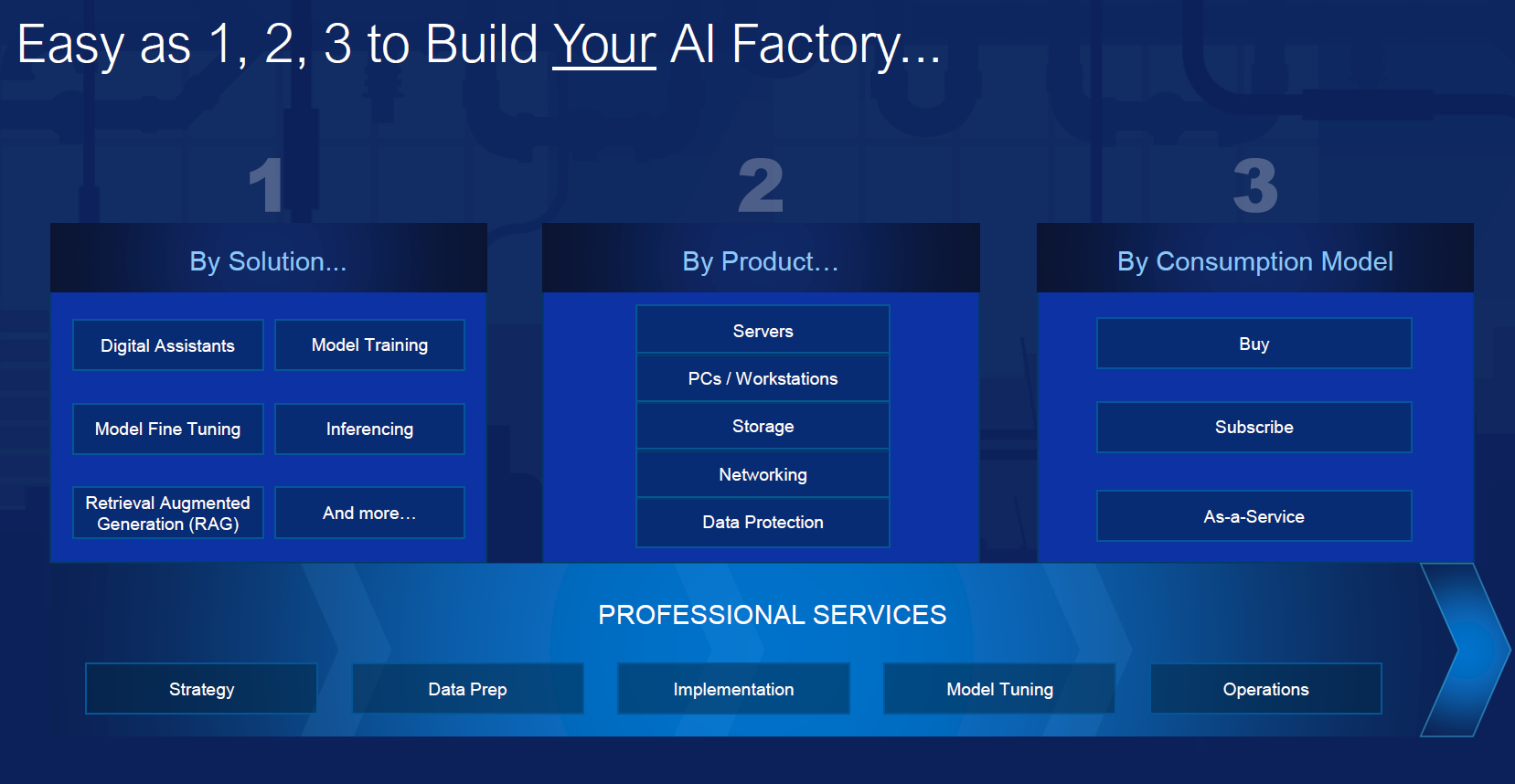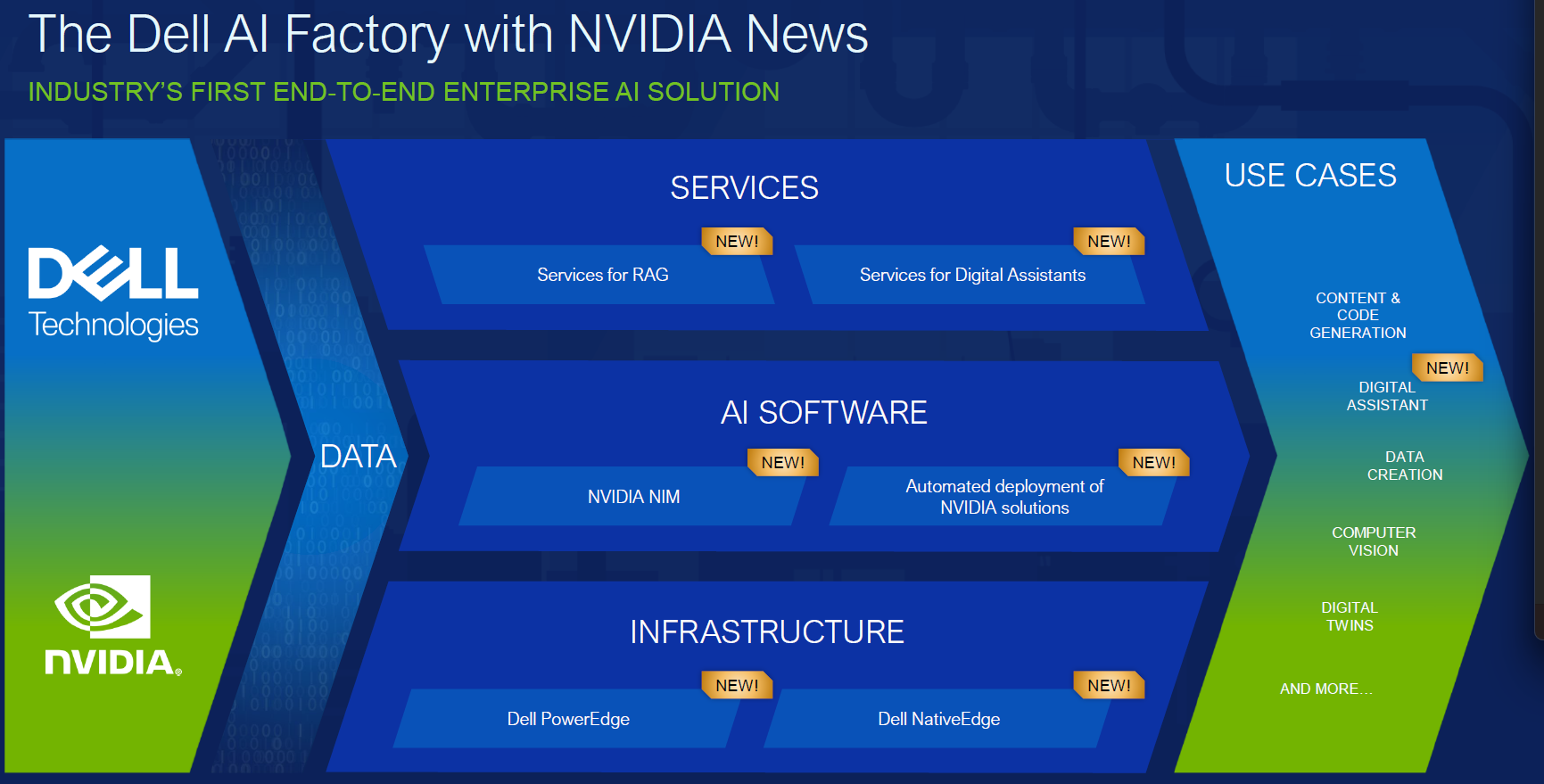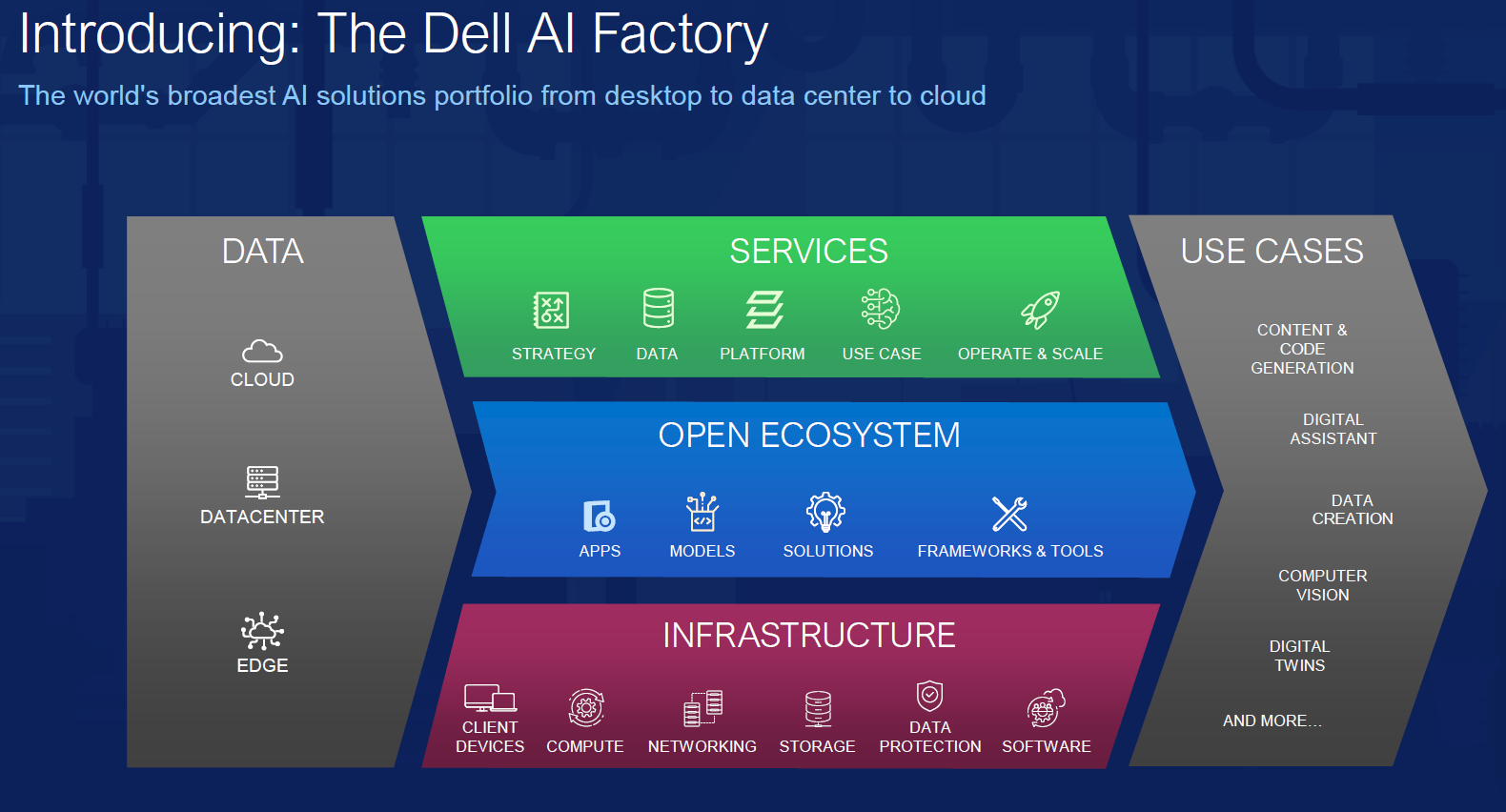Dell Technologies is going all-in on AI factories and enabling generative AI workloads powered by a wide range of third parties as well as Nvidia-flavored efforts.
What Dell is ultimately trying to do is drive enterprise adoption based on data needs, services, an open ecosystem, infrastructure innovation and use cases. With validated and optimized designs, Dell is looking to accelerate AI adoption by simplifying deployments and improving returns on investment. Dell has seen strong demand in AI-optimized servers and has forged strong partnerships with Nvidia, Hugging Face and a bevy of AI players.
Speaking at the Dell Technologies World, Chairman Michael Dell said the company is reinventing itself again as it does with multiple technology pivots.
Dell said the generative AI era will be a "sprint and a marathon." "The uptake and demand for AI is unprecedented," he said. "It will touch every industry in every organization. but each industry and each organization will have its own specific requirements and needs.
He added:
"If you have engineers and a call center and you're not using an LLM based Assistant, you're already behind. But large language models don't create value on the factory floor. For those you need vision models on diverse models, and real world models. Other models will tackle other problems. We're still in the early stages of model training. I'm blown away by the progress of open and closed large and small models by the exploding set of enterprise use cases. For inference and for assistance. We're seeing small models that are incredibly capable, that are faster and inferencing and more efficient and lower cost. Eventually the application of AI will be as broad as the internet."
At Nvidia GTC, Dell Technologies was highlighted as a key partner to build out AI factories. At Dell Technologies World, the companies delivered. In addition, Dell is also offering multiple building blocks to build out with packaged systems for use cases, product and consumption model. Sam Grocott, Senior Vice President, Product Marketing at Dell Technologies, said the company is building out AI factory offerings that cover the "broadest ecosystems across applications, infrastructure and partners" as well as the "Nvidia-flavored easy button."

When you boil down Dell Technologies World news, it boils down to the broad AI factory strategy and then the building blocks and packages of systems underneath.
The broad AI factory play will include a bevy of components including AMD and Intel AI accelerators and processors. Grocott said:
"We've got strong partnerships with Intel, AMD and Nvidia. Obviously, we're going to continue to harvest that flexibility and choice for our customers depending on which partnership or solution they want to lean into. We've got them all lined up across, clients, data center and all the way up to the cloud."
"We're going to be choosing best of breed partners to pull in and implement our IP along with our partner IP to simplify, package up and then make it consumable."
But given Nvidia's lead, Dell's AI factory stack built on Nvidia GPUs and software are fully baked. Nvidia CEO Jensen Huang said Dell Technologies AI factory effort will be the largest go-to-market partnership the GPU maker has. "We have to go modernize a trillion dollars of the world's data centers," said Huang.
- Nvidia acquires Run.ai for GPU workload orchestration
- Nvidia Huang lays out big picture: Blackwell GPU platform, NVLink Switch Chip, software, genAI, simulation, ecosystem
- Nvidia today all about bigger GPUs; tomorrow it's software, NIM, AI Enterprise
Dell PowerEdge XE9680L is designed for Nvidia HGX B200, supports 8 GPUs in a dense 4U form factor, has network throughput with 12 PCIe slots and liquid cooling. The system also supports 400G Ethernet as well as Nvidia's InfiniBand while supporting up to 72 GPUs per rack.
According to Dell, the Nvidia-powered AI factory will also make use of Nvidia AI Enterprise and frameworks outlined at Nvidia GTC. Dell will also wrap services around Nvidia deployments of software and infrastructure.
Dell NativeEdge automates delivery of Nvidia frameworks to edge devices.

And here's a look at the building blocks.
Infrastructure
- Dell AI PCs. Why are AI PCs included in the AI factory mix? Dell officials see edge devices as critical parts of AI workloads. Dell announced five new laptops featuring Qualcomm's Snapdragon X Series processors. The Latitude 7455 and 5455, Inspiron 14 Plus and 14 and XPS 13 will be available with Qualcomm chips, a dedicated AI key and the ability to run 13 billion parameters running on a PC.
- Dell PowerScale F910, an all-flash storage system that has 20x performance than PowerScale F900 and 6x performance vs Azure NetApp files. PowerScale F910 is the first ethernet storage for Nvidia DGX SuperPod and is available on-premises or in the cloud.
- Dell Z9864F-ON networking for ethernet fabrics for AI. The systems features Enterprise Sonic 4.4 with SmartFabric Manager and Broadcom's Thor2 network interface card. The system can minimize congestion and supports 8,000 GPU nodes.
Ecosystem
- Dell and Hugging Face have created an Enterprise Hub, an authenticated portal with optimized open-source models for on-premises deployments. The hub includes models optimized for Dell infrastructure, dedicated containers, scripts and technical documents and software dependencies.
- Dell PowerEdge XE9680, XE8640 and R760xa will be optimized for Meta's Llama 3 for on-premises deployments.
- Dell's AI infrastructure will integrate Microsoft Azure AI services with Apex Cloud Platform for Microsoft Azure.
Services
- Dell will launch a set of services to develop Microsoft Copilot in Windows, sales, security and GitHub. The services are designed to plan, design, implement and test and operate at scale.
- The company added Accelerator Services for Dell Enterprise Hub for generative AI prototyping and deploying with Hugging Face models.



